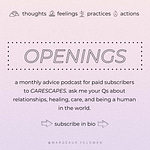Hello dear ones,
Welcome to OPENINGS, a monthly(ish) mini-podcast where I offer advice in response to your questions. Before we get going,I wanted to let y’all know that this will be the last episode, as I shift around some offerings to make space for others. I’ve been so honoured to receive your questions. Thank you from the bottom of my heart for trusting me. I’ll look forward to continuing to connect with you through CARESCAPES and my Instagram.
This episode is all about having hard conversations and talking about boundaries. I wanted to remind folks / give you an FYI that my bestie and I started an Instagram a while back called @how.2.say.it where we shared convo templates on a variety of topics including dating, friendship, boundaries, health, and more. We haven’t had the time or capacity to post for quite some time, but you can still find all of our posts by going to how.2.say.it on Instagram.
A reminder that you can become a paid subscriber! I’m so grateful for all of the folks who help support this newsletter. If you feel like you can spare $5/month (or a little less if you get the full year subscription), you can become a paid subscriber here. 10% of proceeds from each month’s subscriptions are redistributed to a mutual aid call from a Black, Indigenous, or person of color.
Thank you so much for your support!
TRANSCRIPT
Okay, let’s get into our first question:
I have recently started dating again after a long, monogamous relationship. I really like the person I am seeing - they are warm, open, thoughtful and smart. During our conversations, they have made some throwaway comments that have made me think that we are not on the same page with regards to social justice, however I am getting the impression that they may simply lack the vocabulary and exposure to progressive politics. They come from a very homogenous and conservative culture and when probing further, we do seem to share the same principles and values. Part of me does not want to continue the relationship if I have to do the labour of educating someone, while another part feels patient enough to do this and see how things develop. As someone who is queer and disabled, I simply don't know if I can extend myself that far on topics which are so pertinent to my identity, in order to feel seen. Do you have any advice on how to proceed?
First I just want to acknowledge and celebrate the graciousness that you’re offering this person. When people grow up in homogenous communities and are being exposed to conservative world views, it makes a lot of sense that they’d be lacking the language that so many of us in the social justice community have. One thing I’ve really seen folks on the left struggle with is meeting people where they’re at. I remember when there was a call to post a black square to your Instagram and tag Black Lives Matter. It quickly became apparent that this call wasn’t helping BLM – nor was it something they asked for. I saw just how quickly those who posted a black square were shamed by other white folks on the left. I couldn’t help but wonder if this was maybe the very first “political” action that person had ever taken. Yes, they could’ve spent some more time researching this call before they jumped on the bandwagon. AND, if this is a baby activist, it’s our job to help call them in and guide them towards actions that actually support the BLM movement. Now it shouldn’t be on Black folks to do that labour. This is where white folks have to step in and teach other white folks.
As a fellow queer and disabled person, I definitely find myself more easily frustrated when it comes to explaining my queerness or what it means to be disabled to those who’re straight, cisgender, and ablebodied. And I have even less capacity to talk to men about feminism. That being said, there are some ways that I still choose to share my knowledge with others who’re willing to learn. I can recommend some books that they could read that have made me feel seen in my embodied experience; I can ask them to follow and learn from social media accounts run by folks who share my identities; I can ask them to pay those folks for the workshops they facilitate. Basically, I can ask them to take some concrete steps to filling in this knowledge gap. I would personally do that, and see what their response is, before deciding to opt out of the relationship. I would probably say something like “It’s really important to me to feel seen in my identities as queer and disabled. And I can also find it exhausting to educate people on my lived experience. It would mean a lot to me if you could [insert request].”
Now no one group is homogeneous. My particular experiences as a white, nonbinary femme who lives with chronic pain and complex trauma are going to look different from those who are racialized, trans masculine, those with visible disabilities or episodic illnesses. In fact, even other white, nonbinary femmes with chronic pain and complex trauma are going to experience that differently from me. And so it is important for me to share more about my individual experiences living in a cisheteronormative ableist world. One person’s access need can be another person’s access barrier, and so it is on me to share what it is I expect and need from those who I’m in relationships with. If they’re unwilling or unable to meet those needs of mine, then I will have to say goodbye to that relationship.
As a final thought, I just want to say that it’s totally okay to only want to date people who’re queer and/or disabled. Being with others who understand what it means to exist in the world as a marginalized person can be so life-affirming and necessary. I’m personally done dating cis men, and I feel pretty good about that. I also recently added into my dating profile that I’m looking for other folks who’re still masking in public spaces, because my chronically ill self is really triggered by the amount of folks on the left who’ve given up masking. We’re allowed to set boundaries on who we’re willing to be in relationships with. And, I would also love to see more folks on the left give up this rigid radicalism (shoutout to carla bergman and Nick Montgomery’s Joyful Militancy) and step into their role as elders and teachers. I hope that you’re able to find the balance that feels in integrity and supports you.
Our second and final question:
I have been seeing this person for a few months and we have an incredibly intense sexual and emotional connection. He is in an open relationship with a girlfriend of five years, but believes in relationship anarchy and negotiating terms of all connections outside of this primary relationship. I am also a relationship anarchist but am struggling to reconcile my desire for more frequent and committed connection from him with his already full life. We only see each other every week at best, but usually every two weeks, and I struggle to bring up hard conversations about my desire for a deeper connection and more clarity from him because I don’t want to dampen the good energy of our infrequent meetings. I finally worked up the courage to ask about his feelings last month and he said he has not felt this level of interest in someone alongside his primary relationship so he is in uncharted territory and does not know how to proceed except with intuition. This felt squishy to me but I’m afraid if I don’t accept this flexibility I will lose him. A few weeks later as we were having sex he said “I love you” but didn’t reveal what that means for him. I am worried that I will remain in his waiting room because chasing unavailable people is a pattern of mine, especially when he continues to give me scraps of connection. I don't know what to say to him about this next time as it feels too built up inside of me and as if I'm being insensitive to his boundaries and obsessing over something I will never have.
This sounds like such a hard situation and I want to celebrate all of the self-knowing that’s present here. It sounds like this could be a compatibility issue in terms of capacity. Sometimes we’ll have an amazing connection with someone, but they’re not in a space where they can offer us what we need, or vice versa. That being said, it’s really important for us to not make assumptions and to check in and see if our needs can actually be met. I get why it feels undesirable to have these convos when you see him: you want to enjoy your time together. And I guess I wonder if you’re truly enjoying your time with him if you’re withholding how you’re feeling?
There are so many different ways people do polyamory and it sounds like it would feel supportive to have more clarity around what you both want and what’s possible given your desires and capacity. I would let him know that I’m struggling with the amount of time that you get to see each other, and it’s bringing up questions for you around longer-term compatibility that you’d like to carve out some time to talk about this. You can also let him know that it’s felt hard to broach this conversation with him because you really want to enjoy the limited time that you do have together. I would ask if it would be possible to connect twice in one week: one time to have this convo, and another time to do something fun together – or you could ask for more time when you see each other on that day so that there’s time to have the hard convo and then time for connection. That may not be possible for him every week, but if he cares about this connection and wants polyamory where he has multiple deep connections, then he’ll need to find the time. If he can’t find that time, then you can decide if you want to still have this convo with him when he’s available and if you want to continue to accept what’s on offer, or walk away from the connection.
Regardless of what happens with this person, it sounds like you’re being given an opportunity to break a familiar pattern (one that I know all too well) of accepting scraps of attention when you want and deserve more. Walking away from connections can be so heartbreaking – and that might not need to be what happens here. And, the more I continue to choose myself over a connection that isn’t meeting my needs, the more in my power I feel. Whatever the outcome is, this is a growth opportunity – a chance for you to be a partner to yourself.
Thanks again to those who submitted their questions and to all of you for listening. It’s been a pleasure and an honour.







Share this post